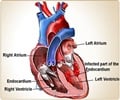Adjusting therapy to keep levels of the protein NT-proBNP (biomarker of cardiac distress) below 1,000 pg/ml reduced incidence of cardiovascular complications, reveals study.

A major and growing cause of death, heart failure occurs when an impaired heart muscle cannot pump blood efficiently. Patients are treated with combinations of medications – including beta blockers, aldosterone blockers, vasodilators and diuretics. But short of waiting for and responding to worsening symptoms there has been no way for physicians to easily monitor how well an individual is responding to treatment. Several studies have shown that blood levels of NT-proBNP drop after treatment begins and such changes can predict prognosis, but trials using target levels of the protein to guide treatment have had inconsistent results.
The current investigation – called the PROTECT study – was restricted to patients with dysfunction of the left ventricle and set an ambitious goal of reducing NT-proBNP levels from an average level of over 2,000 pg/mL in untreated participants at the beginning of the trial to below 1,000 pg/mL. All study participants received standard heart failure treatment, which uses clinical targets such as blood pressure and heart rate to guide medication dosage. But for half of them, measuring NT-proBNP blood levels was included in their regular assessments, and medication was adjusted to reach the NT-proBNP target.
Among the 151 patients who participated in the four-year trial, the rates of worsening heart failure symptoms and heart failure hospitalization were cut in half for those whose care was guided by NT-proBNP measurement. Participants in the NT-proBNP group also reported significantly better quality of life, compared with the standard care group, and were shown by echocardiography to have greater improvement in both the structure and function of the heart muscle.
"We feel strongly that the concept of biomarker-guided care – which allows us to give the drugs we already have in a more individualized manner – is here to stay. However, the results we achieved in this study need to be replicated in a larger, multicenter trial, which is currently in the works along with a study examining natriuretic peptide testing in the home," says Januzzi, an associate professor of medicine at Harvard Medical School. "If these results pan out the way we expect, this approach could lead to improved cardiac function and better quality of life for patients, as well as reduced health care expenditures. The use of biomarkers as an objective tool to monitor and guide care has come a long way since the first pilot studies. We know much more now about the approach and how it is best used. The potential for this approach is considerable."
Source-Eurekalert














